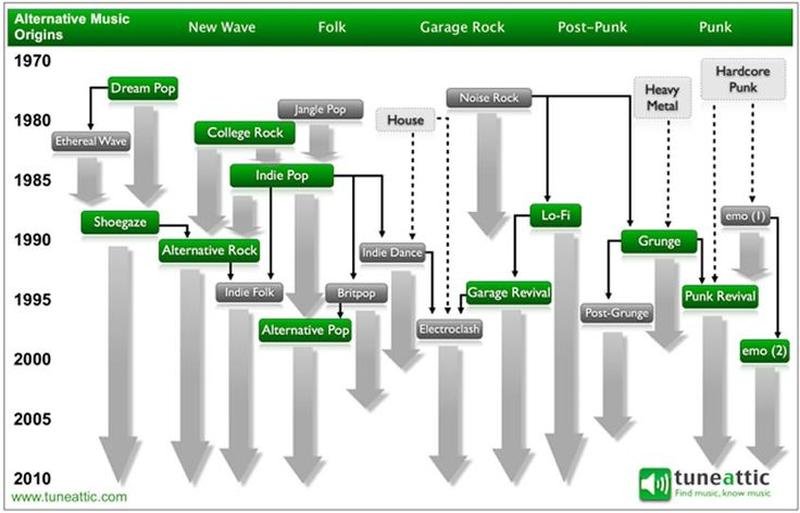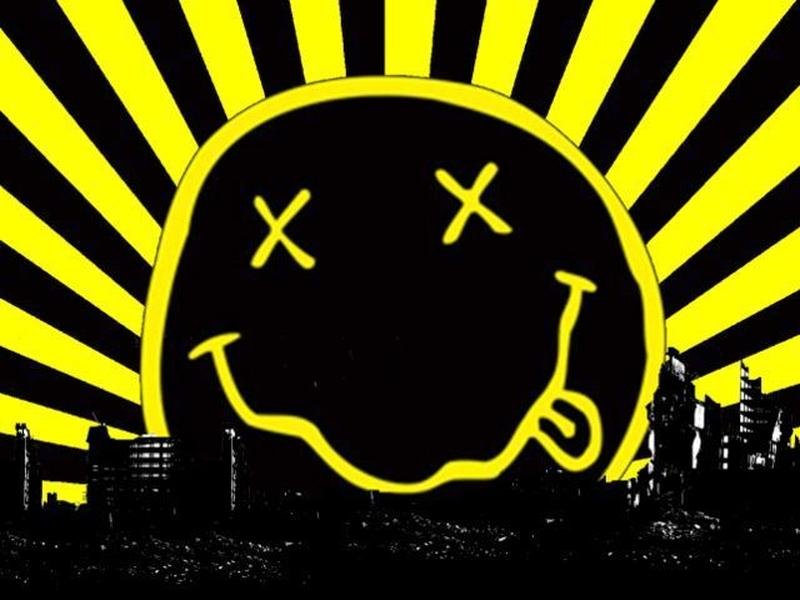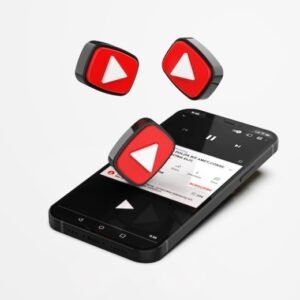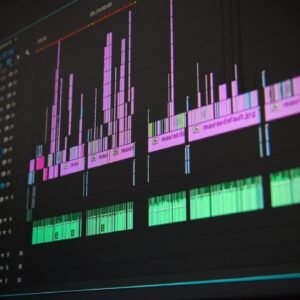Alternative music genre is a music genre that emerged in the 1980s and became widely popular in the 1990s. After the punk rock movement in 1976, pop-punk emerged as a genre. It is not clearly defined what the line between alternative and pop-punk is and tends to be blurred at times where bands are considered either one of those or both. There are also genres of post-punk on the alternative side that are sometimes identified as both. The term alternative music genre was used in the 1970s to describe rock bands that did not fit the mainstream genres of glam, blues rock or UK rock.
In this article, I will talk about “Alternative Music Genre”. Let’s start.
Definition: What Is Alternative Music?
Alternative Music Characteristics
Alternative music is generally considered to be a subgenre of rock music that consists of musicians who eschew the mainstream styles of rock music in favor of more individualistic approaches. Alternative bands and artists have existed for years, but their popularity has increased significantly in the last decade.
The best-known alternative bands include Nirvana, Pearl Jam and Radiohead. The term “alternative rock” is sometimes used interchangeably with “indie rock,” although there are other types of indie rock that do not fall into the alternative genre.
Alternative music was first coined in the 1980s by British music journalists trying to describe bands that didn’t fit into other genres (such as punk or new wave). The musicians themselves were not happy with this label and insisted they were simply playing music they liked and didn’t want to conform to any particular style or genre.
Alternative music is a genre of rock music that emerged from the independent music underground of the 1980s and became widely popular in the 1990s. In this instance, the word “alternative” refers to the genre’s distinction from mainstream rock music. The term’s original meaning was broader, referring to a generation of musicians unified by their collective debt to either the musical style or simply the independent, DIY ethos of punk rock, which in the late 1970s laid the groundwork for alternative music. At times it has been used as catchall phrase for rock genres that at the time of its mainstream prominence lacked a name.
Alternative bands during the 1980s generally played in small local clubs, recorded for indie labels and their sounds were distributed through fanzines and smaller record labels. Sounds range from the gloomy soundscapes of gothic rock to the guitars of indie pop to the dirty grunge of alternative metal. Alternative bands during this period would not have been played on mainstream radio, but they were mainstays on college radio stations and MTV.
Examples Of Alternative Music
Once In A Lifetime – Talking Heads (1981)
One of the most influential alternative bands of all time, Talking Heads are also one of the most consistently inventive, innovative and downright weird. The New York-based group formed in 1975 with David Byrne on vocals and guitar, Chris Frantz on drums, Tina Weymouth on bass and Jerry Harrison on keyboards.
The band’s first album, Talking Heads: 77 (1977), was a major success in Europe but not until their third album, More Songs About Buildings And Food (1978), did they find mainstream success in America. Their next three albums; Fear Of Music (1979), Remain In Light(1980) and Speaking In Tongues (1983) are regarded as classics and are considered to have influenced many artists that followed.
Once In A Lifetime – Talking Heads (1981)
This song was released as a single in 1981 but was originally written by David Byrne during the Remain In Light sessions in 1980. It was recorded at Compass Point Studios in Nassau, Bahamas with Brian Eno producing.
People Are People – Depeche Mode (1984)
Depeche Mode
People Are People (1984)
A more upbeat song from the same album, “People Are People” was actually inspired by the “safe sex” campaign in the UK at that time. With lines like “I don’t believe in miracles, I just believe in me and you,” it was definitely a more positive song than some of their earlier work.
The Cure
In Between Days (1985)
This is another one of those songs with a great melody that is easy to sing along with. It has a nice beat and is fun to listen to. The lyrics are also pretty catchy too!
Smells Like Teen Spirit – Nirvana (1991)
The alternative music genre is a diverse group of rock subgenres that emerged from the independent music scene of the 1980s and became widely popular in the 1990s. Alternative bands rejected the industrialization and commercialization of punk, which had become popular by the mid-1990s, with a back-to-basics philosophy that was rooted in traditional guitar riffs and songwriting.
Alternative rock was initially used as a catchall term to describe underground music from artists that did not fit into the mainstream genres of the time. As many alternative bands gained popularity, it became increasingly obvious that they were not limited to a single subgenre, but instead encompassed a wide range of styles.
The alternative genre’s mainstream popularity peaked in the early 1990s with grunge bands like Nirvana and Pearl Jam, who helped bring alternative rock into the mainstream; however, it has seen a decline in interest since the late 1990s.
You Oughta Know – Alanis Morissette (1995)
Alanis Morissette’s 1995 album Jagged Little Pill is one of the most groundbreaking albums in rock music, and the title track is one of the greatest songs ever written.
Alanis Morissette was born on June 1st, 1974 in Ottawa, Canada. She got her start singing in bars and coffee shops around Ottawa before signing a record deal with MCA Records in 1991. Her debut album was released in 1993, but it wasn’t until 1995 that she became a household name with Jagged Little Pill. The lead single “You Oughta Know” has been called one of the greatest songs of all time, and it’s easy to see why: the song tells an ex-boyfriend how she feels about him after finding out he’s been seeing someone else – namely that she knows all about it! The song has been covered by artists including Kelly Clarkson, Pink and Florence + The Machine.
Alanis Morissette’s 1995 debut album, Jagged Little Pill, is a landmark in alternative rock music. The album sold more than 33 million copies worldwide and launched Morissette into stardom.
The album’s first single, “You Oughta Know,” was originally released as a hidden track on her previous album (1993’s Alanis). It was later included as the opening track on Jagged Little Pill and released as a single. The song reached number one on the Billboard Alternative Songs chart and number three on the Billboard Hot 100 chart.
The second single from Jagged Little Pill was “All I Really Want,” which peaked at number five on the Billboard Alternative Songs chart and number 15 on the Billboard Hot 100 chart.
Mr. Brightside – The Killers (2003)
Mr. Brightside – The Killers (2003)
The Killers’ debut album Hot Fuss was released in 2004, but didn’t become an international hit until the following year, when Mr. Brightside became a radio staple. The song is about a failing relationship, which makes it relatable for anyone who’s ever had their heart broken.
The song is catchy and upbeat with distorted guitars and drums, but it also has some darker elements that give it emotional weight. It’s easy to sing along to while still being able to relate to the story behind the lyrics. It’s a perfect example of how alternative rock can be fun but also serious and meaningful at the same time!
The Killers are an American rock band formed in Las Vegas, Nevada. The group formed in 2001, and have since released five studio albums: Hot Fuss (2004), Sam’s Town (2006), Day & Age (2008), Battle Born (2012) and Wonderful Wonderful (2017).
In 2003, the band released their debut album Hot Fuss to critical acclaim from both critics and fans alike. The album produced the hit singles “Somebody Told Me”, “All These Things That I’ve Done”, “Smile Like You Mean It”, “Mr. Brightside” and “All These Things That I’ve Done”. Mr. Brightside became a worldwide smash hit and reached #1 in the UK Singles Chart as well as reaching #2 on the Billboard Modern Rock Tracks chart in the United States.

Welcome To The Black Parade – My Chemical Romance (2006)
My Chemical Romance – Welcome to the Black Parade
My Chemical Romance is a rock band from New Jersey, USA. They were formed in 2001 by lead singer Gerard Way, guitarists Ray Toro and Frank Iero, bassist Mikey Way and drummer Matt Pelissier. The band released their debut album I Brought You My Bullets, You Brought Me Your Love in 2002. The album contained the hits “Helena” and “I’m Not Okay (I Promise)”. Their second album Three Cheers For Sweet Revenge was released in 2004 with the singles “The Ghost of You”, ” I Don’t Love You” and “Helena”. During this period they toured with many other bands including Fall Out Boy and The Used. In 2006 they released their third album The Black Parade which contained the singles “Welcome To The Black Parade”, “Teenagers”, “Famous Last Words” and “Dead!”. My Chemical Romance have also been involved with several side projects including The Mad Gear And Missile Kid EP (2005) and Danger Days: The True Lives Of The Fabulous Killjoys (2010).
Jesus Christ – Brand New (2006)
Jesus Christ – Brand New (2006)
The first time I heard this song I was in my old friend’s car. It was a sunny day, and he was playing it on the radio. At that time I didn’t know who Brand New were, but after listening to that song for so many times, I knew that it was the best song ever made.
It has something about it that makes me feel like I’m going through something similar to what Jesse Lacey is singing about. The lyrics are just so beautiful and deep, and they make me want to cry everytime I listen to them. The music video also helps me feel even more connected with this song as well as with Jesse Lacey himself.
Jesus Christ was the debut album by Brand New, released in October 2006. It was recorded at the Long Pond studio in Upstate New York, and produced by Mike Sapone. The album’s lyrical content has been described as being about “love, death and loneliness”, with vocalist Jesse Lacey citing the album’s inspiration as coming from his personal experiences.
The album is considered a departure from Brand New’s earlier work as it focuses more on incorporating keyboards, synthesizers and stringed instruments into their sound. Jesus Christ was met with generally positive reviews from critics upon release, who praised its songwriting and production but criticized its lack of variety. The album charted at number 48 on Billboard 200 with first week sales of just over 12,000 copies sold.
Diane Young – Vampire Weekend (2013)
Vampire Weekend: Diane Young
Vampire Weekend is an alternative rock band from New York City. The band’s music combines elements of punk, indie rock and pop with African, Latin American, and Caribbean music.
On October 29, 2013, Vampire Weekend released their third album titled Modern Vampires Of The City. The album was produced by Ariel Rechtshaid and Rostam Batmanglij and won the Grammy Award for Best Alternative Music Album in 2014.
The track “Diane Young” is one of the stand-out tracks on Modern Vampires Of The City. It’s a fun song that features a catchy chorus and great lyrics about being young and getting older but staying true to yourself.
In the last few years, Vampire Weekend has become synonymous with alternative music. The band’s lyrics are often quirky and witty and their music is full of energy. Diane Young is one of their more recent songs that shows off the band’s talent.
If you’re new to alternative music, this is a good place to start. It’s got a catchy beat and it’s fun to listen to! If you like Vampire Weekend, try listening to other bands in the same genre – they might be right up your alley!
Los Ageless – St. Vincent (2017)
Los Ageless – St. Vincent (2017)
St. Vincent’s fifth album, MASSEDUCTION, was released in 2017 and is widely considered to be one of the best albums of the year. It was also a commercial success, debuting at number one on the Billboard 200 chart. She has won six Grammy Awards, including Best Alternative Music Album for Masseduction in 2018.
St Vincent’s previous albums were all very different from each other, but they all fit together as a cohesive body of work that showcases her talent as a songwriter and musician. Her music has been described as psychedelic rock, art rock and electropop.
Top Alternative Musicians
Morrissey (The Smiths)
Alternative rock (also called alternative music, alt-rock or simply alternative) is a style of rock music that emerged from the independent music underground of the 1980s and became widely popular in the 1990s. In this instance, the word “alternative” refers to the genre’s distinction from mainstream rock music. The term’s original meaning was broader, referring to a generation of musicians unified by their collective debt to either the musical style or simply the independent, DIY ethos of punk rock, which in the late 1970s laid the groundwork for alternative music. At times, “alternative” has been used as a catch-all description for music from underground rock artists that receives mainstream recognition, or for any music, whether rock or not, that is seen to be descended from punk rock (including some examples of punk itself).
Alternative music is a term that encompasses a broad range of genres and styles of popular music that don’t fit into mainstream music.
Alternative rock, for example, is a genre of rock music that emerged during the 1980s and became widely popular in the 1990s. Bands like R.E.M., Smashing Pumpkins and Nirvana are among the most famous alternative rock bands.
The term “alternative” was first used to describe rock artists who did not fit into the mainstream music scene. The popularity of alternative rock steadily increased over time and by the late 1980s it had become one of the dominant genres in popular music. It continues to be successful today, although its popularity has declined somewhat since 2000 due to pop punk taking over as the most popular genre for teenagers and young adults in America today.
Thom Yorke (Radiohead)
Thom Yorke is a British musician, singer, and songwriter best known as the lead singer of the alternative rock band Radiohead. Radiohead gained popularity in the mid-1990s with their album The Bends and single “Creep”. After releasing two more albums and performing at Lollapalooza in 1994, Radiohead began to receive widespread attention with their fourth album OK Computer (1997), which featured a more expansive sound and themes of modern alienation.
Yorke formed Atoms for Peace with musicians including Red Hot Chili Peppers bassist Flea and Radiohead producer Nigel Godrich in 2009, releasing an album of electronic music in 2013 that debuted at number one on the Billboard 200 chart. Yorke has also collaborated with artists such as Björk, PJ Harvey, Flying Lotus, Arca and Beck; released his debut solo album Tomorrow’s Modern Boxes in August 2014; and performed a soundtrack for a documentary about climate change called Before the Flood (2016).

Hayley Williams (Paramore)
Hayley Williams (Paramore)
Hayley Williams is the singer for Paramore. She also sings in the band’s most recent album and has been performing with her band since she was 15 years old. She has a powerful voice, which is why she has been featured on many songs and in different genres.
Hayley Williams is known to be one of the best singers in rock music. She started out as a member of Paramore but has also done solo work as well. You can hear her singing on tracks from artists like Katy Perry, Taylor Swift, and Miley Cyrus.
Hayley Williams is a rock and roll star. She’s the lead singer for Paramore, one of the biggest bands in alternative rock and pop-punk music.
She’s also an outspoken feminist who has no problem taking on sexism in the music industry, from fellow musicians to fans in the crowd. In 2015, Williams wrote an op-ed for Billboard where she discussed her experiences being harassed by male fans who felt entitled to her attention.
“It’s not something I’m comfortable talking about publicly, but it happens often,” she wrote. “I’ve been groped while signing autographs, had men follow me to the bathroom, had men attempt to pick me up in front of my friends.”
Williams was also featured on Time Magazine’s list of 100 Most Influential People for her work as an advocate for women’s rights and gender equality.
Jack White (The White Stripes)
Jack White (The White Stripes)
Jack White is a musician, singer and songwriter who is best known as the founder and lead singer of The White Stripes. He has also contributed as a member of multiple bands such as The Raconteurs, The Dead Weather and The Peacocks. His musical style includes elements of blues rock and garage rock.
Jack White was born on July 9, 1975 in Detroit, Michigan. At age 17, he formed the band Goober & The Peas with his stepfather’s nephew Brendan Benson (who later became a member of the alternative country band The Raconteurs). In 1997, he met Meg White at an underground Detroit show where she played drums for another band. They soon started playing together as “The White Stripes”.
Jack White received critical acclaim for his work with The White Stripes from 2000 onwards. In 2003, their album Elephant was nominated for three Grammy Awards including Best Alternative Music Album; it won for Best Alternative Music Performance (for the single “Seven Nation Army”). Their follow-up album Get Behind Me Satan also won a Grammy Award for Best Alternative Music Performance in 2005 (for the single “Blue Orchid”).
Lorde
Lorde is the stage name of Ella Yelich-O’Connor, a New Zealand singer-songwriter who has achieved both critical acclaim and chart success with her debut album, Pure Heroine (2013). Her sound has been compared to that of Lana Del Rey, whom Lorde cites as one of her biggest inspirations. She won two Grammy Awards for the song “Royals” in 2014. Her second studio album Melodrama was released in 2017.
In 2017, Lorde was included on Time magazine’s list of the 100 most influential people in the world. She was praised by U2 lead singer Bono for her ability to write about teenage angst and heartbreak in a way that makes her music relatable to young listeners. She has been included on several other year-end lists: Forbes ranked her at number 13 on their “Celebrity 100”, while The Guardian named her as one of their top ten artists to watch in 2014. In December 2013 she became the youngest solo artist to achieve platinum certification status in Australia. She also topped national polls regarding who should be inducted into the New Zealand Music Hall of Fame.
The History Of Alternative Music
Popularity
Alternative music is a genre of rock music that emerged from the independent music underground of the 1980s and became widely popular in the 1990s. In this instance, the word “alternative” refers to the genre’s distinction from mainstream rock music. The term’s original meaning was broader, referring to a generation of musicians unified by their collective debt to either the musical style or simply the independent, DIY ethos of punk rock (which in the late 1970s laid the groundwork for alternative music). At times it has been used as catch-all phrase for rock genres that have emerged since punk rock such as post punk and grunge.
The term “alternative rock” was coined in the early 1980s to describe punk rock-inspired bands on college radio stations across America after British post-punk groups like Gang Of Four and Joy Division had been signed to major labels. Alternative bands were also defined by their attitude more than their sound, eschewing commercialism and musical clichés with their often rawer musical aesthetic which drew influence from sources as varied as folk, country and psychedelia.
State Of The Genre & Where To Go From Here
The state of alternative music is not great. I don’t mean to say that it’s bad, but it’s definitely not great. There are a few genres that seem to be doing well, but the majority of it is declining in popularity and quality.
Alternative music has always been about defying the norm and being different from the mainstream. But in this day and age, with so many artists trying to be different, it’s hard for anyone to stand out and make an impact on society.
Alternative music is supposed to be about pushing boundaries and challenging people’s views on what music can sound like and mean. But now there are so many subgenres that it’s hard for anyone to find something truly unique or special anymore.
The only way for alternative music to survive is if we stop focusing on genres and start focusing on good music again.
Alternative music is a genre of rock, pop, or folk music that doesn’t fit into the mainstream. It’s often associated with punk and indie rock.
Alternative music has enjoyed a resurgence in recent years thanks to the rise of streaming platforms like Spotify and YouTube. The genre has also been prominent in movies and TV shows such as Stranger Things and Riverdale.
The annual Coachella Valley Music & Arts Festival is a big event for alternative bands to perform at, which can help boost their popularity.
There are many subgenres within alternative music, including indie rock and post-punk revival (also known as indie pop).
Alternative music is usually associated with rebellion against authority, but it can also be used to describe any style of music that isn’t mainstream pop or country music.
One of the most famous alternative bands from the 1980s was U2 from Ireland. Their song “Pride (In The Name Of Love)” became famous during the 1984 presidential election when it was used in a commercial for Democratic candidate Walter Mondale.
FAQs for Alternative Music Genre
Now that you understand “Alternative Music Genre”, let’s move on to the FAQ section.
What Classifies As Alternative Music?
Alternative music is a genre of rock music that emerged from the independent rock scene of the 1980s and became widely popular in the 1990s. Alternative bands and artists are often influenced by punk rock, indie rock, and post-punk.
Alternative is a broad term. In fact, it’s a catchall category that includes everything from folk to hip hop, from progressive pop to punk rock and everything in between. And while there are certainly some elements that define all alternative music, there are also many different subgenres and styles within this umbrella term.
The best way to describe alternative is that it’s music that’s not mainstream. It’s not what you hear on Top 40 radio or MTV (although some songs have crossed over into mainstream territory). It can be anything from country to metal or even hip hop — it just needs to be different from what’s popular at the time it was released.
Is Alternative Its Own Genre?
Alternative rock is a genre that emerged from the independent music underground of the 1980s and became widely popular in the 1990s. Alternative bands were not overtly influenced by particular genres, but rather generally incorporated a diverse range of styles including punk rock, post-punk, new wave, psychedelic rock and electronic music.
The term “alternative” was coined in the 1980s to describe punk rock-inspired bands on independent record labels that did not fit into the mainstream genres of the time. These bands were often characterized by their lyrics, which were often socially conscious, anti-establishment and intentionally political. According to Melody Maker magazine’s Simon Reynolds and Steve Sutherland: “Alternative rock is what you do when you can’t be mainstream.”
Some alternative bands formed during this period had long careers like: The Cure (formed 1976), Pixies (formed 1986), Dinosaur Jr. (formed 1984), Sonic Youth (formed 1981) and R.E.M. (formed 1980). Other bands such as Nirvana, Pavement, and Weezer achieved commercial success in the 1990s with albums such as Bleach (1989), Slanted & Enchanted (1992) and Pinkerton (1994).
How Is Alternative Music Different?
Alternative music is a genre of rock music that emerged from the independent music underground of the 1980s and became widely popular in the 1990s. In this instance, the word “alternative” refers to a genre of rock music that does not belong to the mainstream. Alternative bands and artists tend to experiment with different styles and sounds, and their songs are often characterized by having unusual chord progressions or melodies.
Alternative music often features songs with socially conscious lyrics, although this is not always true. Some artists use alternative rock as a way to get back at authority figures or express anger at their parents or society as a whole through their music.
The origins of alternative rock can be traced back to the late 1960s and early 1970s, when musicians began experimenting with new sounds and genres such as psychedelic rock, progressive rock, glam rock and heavy metal.
In the 1990s, alternative rock became one of the most popular genres in America thanks in large part to bands like Nirvana, Pearl Jam and Soundgarden who gained popularity during this time period.
Is Alternative Music Indie Music?
The term “alternative music” is used to describe any type of music that doesn’t fit into the mainstream. There are a lot of different genres under the alternative umbrella, but most people think of indie rock when they hear it.
Alternative music is usually thought of as underground music that doesn’t have a big label behind it, but there’s no official definition for what makes something alternative. Indie rock is a subgenre of alternative that’s usually defined by its lack of major label support and its focus on guitar-based songwriting.
Indie bands often release their albums independently, without major label backing or distribution. They do this in order to retain more control over the creative process and avoid being swept up by corporate interests or having their sound changed in order to make it more accessible to mainstream audiences.
The term “indie” comes from independent, which refers to any band or artist who works outside the mainstream music industry and retains full ownership over their work — they’re not signed to any major record label or distributor like Sony Music or Universal Music Group.
What Genre Is Billie Eilish?
Billie Eilish is a singer who has been compared to Lorde, Lana Del Rey and Marina & the Diamonds. She’s also the daughter of singer-songwriter and producer, Finneas O’Connell.
Billie Eilish was born in October 2001 and grew up in Los Angeles County, California. She started writing songs at age 11 and released her first EP, Don’t Smile at Me, in 2017. In August 2018, she released her debut album When We All Fall Asleep, Where Do We Go? which reached #1 on the Billboard 200 Chart.
Billie Eilish’s music style has been described as alternative pop or indie rock with elements of R&B and hip hop.
Is Taylor Swift Alternative?
If you’re wondering whether or not Taylor Swift is an alternative artist, the answer is yes. While it may seem like a strange question, considering that Swift’s biggest hits have been pop songs, she has also released plenty of music that would appeal to fans of alternative music.
Swift’s first two albums were country-pop records, but she branched out into more experimental sounds on her third album, Speak Now. The album featured some influences from indie rock and pop-rock bands like Death Cab for Cutie and The Civil Wars.
Since then, Swift has continued to experiment with different genres and styles on each new album. She released 1989 in 2014 as a pop album with elements of electronic dance music (EDM). But her most recent album Reputation was inspired by hip hop artists like Kanye West and Kendrick Lamar and indie rock bands like Tame Impala and The 1975.
The music industry has changed drastically over the past several decades. What was once a business of big record labels and big hits is now a world of independent artists and small releases.
While it’s true that there are many artists who have managed to maintain success in both eras, there are some who were far more successful in one than another.
The most obvious example of this is Taylor Swift. The singer-songwriter has been dominating the pop charts for years, but her recent work has been more heavily influenced by alternative rock than anything else.
So what does it mean to be alternative?
In short: it means being different from what’s popular at any given time. While there are some artists who consider themselves “alternative” despite having no interest in being different (looking at you, Katy Perry), generally speaking, alternative music is defined by its lack of mainstream appeal rather than any specific characteristics or sounds.
Conclusion for Alternative Music Genre
The alternative music genre is for people that are willing to step away from the mainstream. It is for those who like music that has a story to tell and lyrics to be thought about, not just music to make you dance or relax. Alternative music is an umbrella term used by music industry professionals to describe genre of rock that is outside the mainstream norm in its sound, its cultural context and its audience.
Thank you for reading, and I hope you get the point of “Alternative Music Genre”. If not, please contact me or leave a comment below. I would be pleased to help in any way I can.





